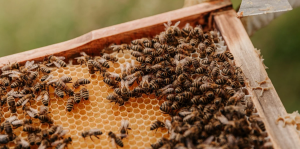Blog
Why is Sound Therapy helping the Bees?

We hear a great deal about the importance of the bees to our continued crop yields and the balance of nature and biodiversity around the globe. But how does this relate to Sound Therapy?
I would suggest that bees are relevant to Sound Therapy because:
Bees work closely in community and are all about connection and collaboration. Sound Therapy helps us connect and communicate with others by making us more receptive to language and heart connection.
The beautiful humming sound of the honey bee is therapy in itself. When you walk under a flowering tree or into a patch of clover in summer, the humming of the bees is music to your ears. That is Sound Therapy too!
And three, bees are our messengers of productivity, connecting the web of life with their fertilisation. Just as Sound Therapy enlivens our whole nervous system by carrying messages between so many of our sensory and neural systems so that our body works in an integrated way.
We learned from Dr Tomatis that sound can have many different impacts on our health. While loud machine noise can damage us and cause deafness, the sounds of nature are actually healing. One example of natural healing sounds is the buzzing of bees.
The frequency of a bee’s hum is also a communication message. Researchers have found that there is a certain frequency range for a healthy hive, so that the health of a bee colony can be detected from the tones it puts out.
https://allaboutheaven.org/science/frequency-of-a-bee-s-hum/121
Bees have a highly developed communication system and communicate with other bees using complex coded signals. Therefore bees are being studied to help us understand animal languages. It is thought they communicate about distance and height using coded sound signals.
Researchers in Tel Aviv also asked the question, can flowers hear the bees buzzing? In fact they found that within minutes of sensing vibrations from the wings of approaching pollinators, the plants increased the concentration of sugar in their flowers.
https://strangesounds.org/2019/07/flowers-hear-buzzing-bees-nectar-sweeter-nature-sound.html
Flowers have a concave, bowl shape, much like the ear, making them perfect for drawing in sound waves. This new field of research called Phytoacoustics opens the way for many more questions about plants and sound.
It was also proven in earlier research that plants grow better when exposed to classical music, with some growing an additional 20 percent.
https://www.gardeningknowhow.com/garden-how-to/info/how-music-affects-plant-growth.htm
Significantly, many studies have clearly shown that it is classical music that generates the best response from plants. Some winemakers are known to play classical music to make their grapes taste better.
https://www.ajournalofmusicalthings.com/the-science-is-in-plants-love-music-classical-music-to-be-exact/
Many of our Sound Therapy listeners particularly love listening to Sound Therapy while they are gardening, so we decided that our listeners would love to be part of our plan to give a little support to the bees.
So we decided to link up with Project Honey Bees https://projecthoneybees.com/ because they are doing a great job of educating about the importance of bees for all life, and highlighting the current plight of the bees.
“The greatest journey in my life had been to help many thousans of people to improve their ear and brain health through the use of Sound Therapy”
Rafaele Joudry
Founder and Author
Categories
- A better way to support independent living
- Audio
- Audiology
- Auditory deprivation
- Auditory Processing
- autism
- BBE Process
- Brain
- Brain Optimisation
- Breathing
- Charities we support
- Chemical Toxins
- children
- Choosing the Music
- Classic Music
- Colds and infections
- conductor
- Depression
- Digital Compression
- Dizziness
- Dystonia
- ear infections
- Ear muscles
- Ear Research
- Emotional Wellbeing
- General
- gut brain connection
- Hearing
- i-pod hearing damage
- Indigenous Literacy Day
- Koorie Story telling
- learning difficulties
- Literacy
- Memory
- Meniere's
- musical talent
- Nervous System
- Neuroscience
- Noise
- Nutritional Supplements
- Pauline McLeod
- Preventing Sudden Deafness
- Read and Exceed
- Reducing Noise exposure in Australia
- Research
- Sound Therapy
- Stress
- Supplements or drugs
- The Music
- Tinnitus
- Tinnitus Treatment
- Tomatis
- travel
- vaccination
- vertigo
- Videos
